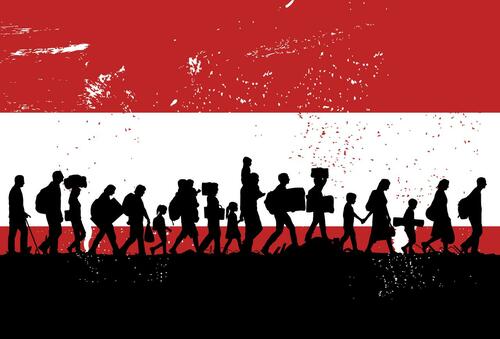
Authored by John Cody via Remix News,
Illegal immigration will loom large on the minds of Austrians as they head to vote in October’s presidential elections...
Austria’s government is under pressure to tackle its border crisis after 3,000 illegal immigrants entered the country this week, a new record that already surpassed a fresh record reached in the first week of September this year. The new migrant crisis, which is dominating headlines in Austria, is now posing a challenge to the pro-refugee president, Alexander van der Bellen, who is running for reelection on Oct. 9.
Austria has faced a massive influx of refugees this year, registering 47,000 people crossing into the country, which is up from 19,000 in 2021. Most of these illegal immigrants are from the Middle East and Asia, including Afghanistan, Pakistan, and India. With polling consistently showing that Austrians are opposed to mass immigration, and with the memory of horrific gang rapes and terrorist attacks committed by foreigners still fresh in the country’s mind, the population may second-guess awarding van der Bellen with the presidency once again.
With 3,000 illegal immigrants crossing Austria’s border in just one week, there are warnings that the country may see 100,000 new arrivals this year.
“The bad records follow one another every week, but that still does not seem to incite the current interior minister, Gerhard Karner, to act,” said Hannes Amesbauer, security spokesman for the conservative Freedom Party (FPÖ) party, who warned against “100,000 illegal refugees.”
Austria is already facing massive integration problems. One in four people in Austria have foreign origins, and when it comes to schools, kindergartens, hospitals, and housing, the country is under increasing pressure. In addition, Austrians prisons are already overburdened, with 50 percent of all prisoners of foreign origin while this demographic group making up 21 percent of the Austrian population. In addition, 30 percent of all welfare recipients in the country are also of foreign origin. However, those numbers can be misleading, as many of the foreigners are of European origin, such as Germans and Italians. The reality is that Africans, Asians and Middle Easterners make up an even smaller portion of foreigners, yet these are the groups that are most likely to commit a crime in the country and be imprisoned.
Migration a major theme in Austria politics
The social-democratic SPÖ party, currently a member of the opposition, has also criticized the government’s response.
“The interior minister is completely overwhelmed by the asylum programs,” the party claimed, noting an inability to seek “reasonable” international solutions.
The issue of illegal migration has dominated Austrian politics for years, however, the FPÖ has been most adamant about tackling the issue, with the most restrictive immigration policies being implemented by the previous FPÖ interior minister, Herbert Kickl.
Currently, van der Bellen is polling at 45 percent, and the FPÖ presidential candidate, Walter Rosenkranz, is far behind at 18 percent. However, if van der Bellen fails to break 50 percent in the first round, he would likely face Rosenkranz, at which point it could be a much tighter race. In 2016, FPÖ’s candidate for president nearly won in the second round.
The FPÖ warned in 2020 that there are serious expenditures being allocated to integrating foreigners, and with inflation biting into Austrian’s pocketbooks, the conservative party is working to further highlight this issue in 2022. The party stated in Austria’s National Council that the provision and care of “uninvited foreigners” is a burden on the budget in various areas and devours “huge sums” of the state’s money, according to Austrian newspaper Vol.at.
Kickl, the former interior minister, said social transfers to foreigners in the country amount to €2 billion in expenditures from basic care to family benefits, including integration, social assistance, health care, labor market policy, and education.
Authored by John Cody via Remix News,
Illegal immigration will loom large on the minds of Austrians as they head to vote in October’s presidential elections…
Austria’s government is under pressure to tackle its border crisis after 3,000 illegal immigrants entered the country this week, a new record that already surpassed a fresh record reached in the first week of September this year. The new migrant crisis, which is dominating headlines in Austria, is now posing a challenge to the pro-refugee president, Alexander van der Bellen, who is running for reelection on Oct. 9.
Austria has faced a massive influx of refugees this year, registering 47,000 people crossing into the country, which is up from 19,000 in 2021. Most of these illegal immigrants are from the Middle East and Asia, including Afghanistan, Pakistan, and India. With polling consistently showing that Austrians are opposed to mass immigration, and with the memory of horrific gang rapes and terrorist attacks committed by foreigners still fresh in the country’s mind, the population may second-guess awarding van der Bellen with the presidency once again.
With 3,000 illegal immigrants crossing Austria’s border in just one week, there are warnings that the country may see 100,000 new arrivals this year.
“The bad records follow one another every week, but that still does not seem to incite the current interior minister, Gerhard Karner, to act,” said Hannes Amesbauer, security spokesman for the conservative Freedom Party (FPÖ) party, who warned against “100,000 illegal refugees.”
Austria is already facing massive integration problems. One in four people in Austria have foreign origins, and when it comes to schools, kindergartens, hospitals, and housing, the country is under increasing pressure. In addition, Austrians prisons are already overburdened, with 50 percent of all prisoners of foreign origin while this demographic group making up 21 percent of the Austrian population. In addition, 30 percent of all welfare recipients in the country are also of foreign origin. However, those numbers can be misleading, as many of the foreigners are of European origin, such as Germans and Italians. The reality is that Africans, Asians and Middle Easterners make up an even smaller portion of foreigners, yet these are the groups that are most likely to commit a crime in the country and be imprisoned.
Migration a major theme in Austria politics
The social-democratic SPÖ party, currently a member of the opposition, has also criticized the government’s response.
“The interior minister is completely overwhelmed by the asylum programs,” the party claimed, noting an inability to seek “reasonable” international solutions.
The issue of illegal migration has dominated Austrian politics for years, however, the FPÖ has been most adamant about tackling the issue, with the most restrictive immigration policies being implemented by the previous FPÖ interior minister, Herbert Kickl.
Currently, van der Bellen is polling at 45 percent, and the FPÖ presidential candidate, Walter Rosenkranz, is far behind at 18 percent. However, if van der Bellen fails to break 50 percent in the first round, he would likely face Rosenkranz, at which point it could be a much tighter race. In 2016, FPÖ’s candidate for president nearly won in the second round.
The FPÖ warned in 2020 that there are serious expenditures being allocated to integrating foreigners, and with inflation biting into Austrian’s pocketbooks, the conservative party is working to further highlight this issue in 2022. The party stated in Austria’s National Council that the provision and care of “uninvited foreigners” is a burden on the budget in various areas and devours “huge sums” of the state’s money, according to Austrian newspaper Vol.at.
Kickl, the former interior minister, said social transfers to foreigners in the country amount to €2 billion in expenditures from basic care to family benefits, including integration, social assistance, health care, labor market policy, and education.






